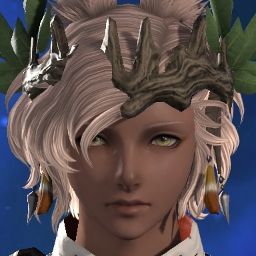So, I definitely will agree that callouts make a fight easier when you're new to it and trying to figure it out. It's one reason I when I run learning parties later in the tier, I'll always offer Discord for callouts and explanations of mechanics.
Because I do think there's a huge difference between "I understand what to do for this strat" and "I understand the mechanic itself, and thus why this strat works". It may not sound like one, but I genuinely think it's a huge one.
I have said before -- and I do stand by this -- that callouts should ever only be a sanity check on your own read of mechanics. But when you're still trying to get the mechanics down, that sanity check is really useful.
(I mean, this is part of why I started raid-calling; in order to feel confident enough to raid-call, I need to feel confident in my ability to read the mechanics. It made me push myself further.)
I don't think PF is as bad overall as your experience suggests, but:
- Studies show that humans are very bad at perceiving statistics accurately; something you get emotional about will far outweigh something where you don't, and so your brain starts saying there was a lot more of the emotion-causing one. So while I suspect PF is not necessarily as bad as you feel it is, I also completely believe your brain is holding onto the bad experiences and sort of glazing over the parties that weren't as bad. Because everyone's brain does that.
- Even saying that, I admit Party Finder is wildly uneven at the best of times. You can have a prog party that sees enrage multiple times, and then an enrage-to-clear party that can't make it past the second major mechanic.
So while I think it's completely viable to do a tier in party finder, I will also absolutely concede it's neither the most straightforward nor stress-free method to do so. And frankly, even though I was clearing fights and doing callouts, it was only last tier that I felt confident enough to venture into PF for actual prog groups with complete strangers.
I will agree that the tells, taken as a whole, can be very hard to make out, yes; the fights in this game tend to have very visually 'busy' arenas, and then the mechanics themselves often only add to that.
However, every mechanic I can think of has one or two specific details you can easily see. The real key is not learning to read the entire mechanic, but to read just the one or two things... because almost every mechanic has some hidden pattern, or a very limited number of options it can actually be.
This is actually something I try to focus on in teaching parties; not just 'what do you do for this mechanic', but 'how does the mechanic work, and what is the easy way to read it'. Because I think that is a crucial skill to learn.
Using the current tier and taking P5S as an example: for the first Ruby Glow, I simply look for which poison crystal is almost in the center. If there's a topaz crystal in that same quadrant, the safe spot is the empty square bordering that one. If there is not a topaz crystal in that spot, then that one is the safe square (albeit aaaaaall the way out at the edge).
I do not need to look at the other three squares at all; I just need to glance at that one single thing, and that's enough to call the mechanic for the group.
For the third Ruby Glow -- the 'memory game' -- you only need to see what the first and third safe spots are. The second safe spot will always be rotated one from the first, and the fourth will always be directly opposite the third. So I only need to see 'we start here' and 'the third step is here'; I can ignore the second and fourth steps entirely and still call the mechanic.
Almost every mechanic has some simple way to read it like that... but the game's really good at hiding it behind a lot of smoke and mirrors and flash to make it look harder to read. And once your brain clicks over to that method, most of the mechanics become much easier to read.
I don't think that's 'fake difficulty', that's the game trying to prevent folks from just cheesing mechanics by imposing a stricter penalty. (Because, well, as a playerbase, if there's a way to cheese something we will do it. Honestly, I feel like a portion of this tier is just the devs going "well, okay, try to cheese this tankbuster mechanic!")
But yes, a key part of savage is that the group does need to work together; a lot of mechanics rely on specific people doing specific things, and I will grant it can be pretty frustrating if a group simply fails entirely to do that. It's bad enough when you're dying to your own mistakes, but dying to someone else's mistakes and thus feeling powerless to progress can definitely drive people to get snappish.
(And it certainly doesn't help if the person whose mistakes you're dying to is killing people because they don't understand the mechanic, and no one is explaining it well.)
I recognize the frustration and bitterness, but I'm going to offer a gentle reminder and callback to my earlier statement about how the human brain seizes on negative interactions and gives them greater weight than positive (or neutral) ones.
Random PF groups do not have a 100% chance of failing; I've cleared fights for the first time in PF before, and here's the thing... I'm not particularly good. As I've said in other threads, I define myself as 'more an asset than a liability'; I am not an orange-parsing healer, but I will do tolerable damage, I will keep everyone alive (and will prioritize doing so over my own DPS), and I will do callouts (if applicable) while doing so.
That said, I do also agree that PF is not the easiest way to get yourself more settled and feeling more secure in savage, especially since, yes, the jump from the general content of the game up to savage isn't a particularly smooth incline.
So I do recommend finding a group to run with more consistently -- ideally one willing to explain mechanics! It doesn't have to be a 'real' static with a set 8-person roster and specific meeting times, honestly -- there are groups that are less formal than that. Some are huge, like Primal's "Primal Raid Community" Discord, which often runs teaching parties, others are less formal like the couple of farm groups I belong to.
It might actually not hurt for you to try joining MilkieTea's raid server; a consistent group where you can learn their foibles and what they're likely to do makes for an easier learning environment, no question.
I'm also willing to try to give advice or help where I can; I like teaching fights, though I usually wait until the tier is unlocked to avoid screwing anyone out of chests. But even without actually teaching, I'm certainly able to try going over what I as a raid caller do to read specific mechanics quickly. (You can find me as Packetdancer#4441 on Discord.)
Anyway. That was a lot of words even by Packetdancer standards; hopefully some of them were helpful ones.
-
09-07-2022 01:33 PM #271Player

- Join Date
- Oct 2019
- Location
- Gridania
- Posts
- 1,948
- Character
- Khit Amariyo
- World
- Leviathan
- Main Class
- Sage Lv 100
(0)I aim to make my posts engaging and entertaining, even when you might not agree with me. And failing that, I'll just be very, VERY wordy. Originally Posted by Packetdancer
Originally Posted by Packetdancer
-
09-07-2022 01:46 PM #272
-
09-07-2022 01:48 PM #273Player

- Join Date
- Mar 2016
- Location
- Dravania
- Posts
- 5,778
- Character
- Gemina Lunarian
- World
- Siren
- Main Class
- Scholar Lv 100
You need to understand that helping and giving advice politely is in contrast to someone who trivializes the difficulty of the encounter. Congratz that you cleared it after three nights. I finally cleared it yesterday before reset, so it took me two weeks, and I've done nothing but this fight since 6.2 release. There are still a lot of players out there right now still trying to get their first clear. Are you helping them as well? Or do you now just join 'Duty Complete' parties?
I don't mean to compare grievances. I got frustrated too, and most of that are due to my own screwups. I am far more critical of my own mistakes. However, the clear rate should be a testament to the difficulty of the encounter.(1)
-
09-07-2022 01:55 PM #274
The best part of sephirot is how much it has exposed bad players. A good party skips 2nd knockback/adds entirely.
A bad party hits enrage etc. Watching the people who thought this was another Ultima get absolutely gated and curb stomped has been one of the best clown shows in a while.(7)
-
09-07-2022 01:57 PM #275Player

- Join Date
- Oct 2019
- Location
- Gridania
- Posts
- 1,948
- Character
- Khit Amariyo
- World
- Leviathan
- Main Class
- Sage Lv 100
I do think callouts are really useful when you're starting... up to a point. When you're reading the mechanic and second-guessing yourself and uncertain of the read, reading it as 'I go clockwise' and someone saying 'clockwise!' means "Yay, I was reading it correctly!" Reading it as 'I go clockwise' and someone says 'Counter-clockwise!' you know there's something you're not quite catching about it. (Or the raid-caller messed up, which does sometimes happen. I don't do it often, but I suspect every raid caller has had that moment of calling "East" and meaning, y'know, your other East. What's it called... "West", yeah, that one.)
Conversely, learning a fight without callouts at all can sometimes mean reading it as 'I go clockwise' and then dying, and someone just immediately starts the countdown again without any discussion after the wipe. Did you read it wrong? Did someone else read it wrong and kill you? Did the server just say 'nope', because this game's netcode is at best haunted and possibly outright cursed by some forgotten dark god? WHO KNOWS!
But yes, it's definitely possible to start relying on callouts instead of your own read of mechanics (rather than as a sanity-check on your own read), and I absolutely agree with you that doing so will hinder someone's ability to progress in the long run. It's why I prefer to make callouts rather than listening to them; it forces me to really be on the ball with reading the arena and fight.(0)I aim to make my posts engaging and entertaining, even when you might not agree with me. And failing that, I'll just be very, VERY wordy. Originally Posted by Packetdancer
Originally Posted by Packetdancer
-
09-07-2022 02:10 PM #276
at that point, I either consult the guide or I ask around NN or my LSs.
My first assumption is that I did something wrong. And if after reviewing stuff it turned out that it was someone else's I just shrugged and carry on.
And even after I do it right, I still find ways to refine and do it better without hindering other people.
Like when you stack to bait fists and go to your spot, Instead of sprinting, if I'm on RPR I use Hell's ingress, on DRG I turn and use elusive. That way, I get to the end quickly and there's less chance of clipping.
This also works for wall + circle aoe in EX4 because despite macro, people tend to stack a bit too close and would clip you after AoE so being able to port back instantly is a godsent. And the purple gate staying around also helps tell people where you'll port to(0)
-
09-07-2022 02:41 PM #277Player

- Join Date
- Oct 2019
- Location
- Gridania
- Posts
- 1,948
- Character
- Khit Amariyo
- World
- Leviathan
- Main Class
- Sage Lv 100
Sure, and I approach things similarly. And once you have that foundation of confidence, finding ways to optimize things -- be it your healing/mitigation strategy, or how to move most effectively for a given mechanic -- is half the fun of endgame content, for me.
But if I look back to when I was a brand new shiny fresh-out-of-box raider who could barely find her ass in this game's endgame content with both hands and a map, I definitely know that at that time I lacked the confidence that I'd even be asking the right questions, much less that I'd necessarily be able to effectively make use of the answers. So as I took my first hesitant steps into savage (and often got immediately flattened), I know that I found callouts really useful as they gave me some added sanity-check on whether or not I was reading stuff correctly.(0)I aim to make my posts engaging and entertaining, even when you might not agree with me. And failing that, I'll just be very, VERY wordy. Originally Posted by Packetdancer
Originally Posted by Packetdancer
-
09-07-2022 03:10 PM #278
-
09-07-2022 03:50 PM #279
-
09-07-2022 04:18 PM #280





 Reply With Quote
Reply With Quote










